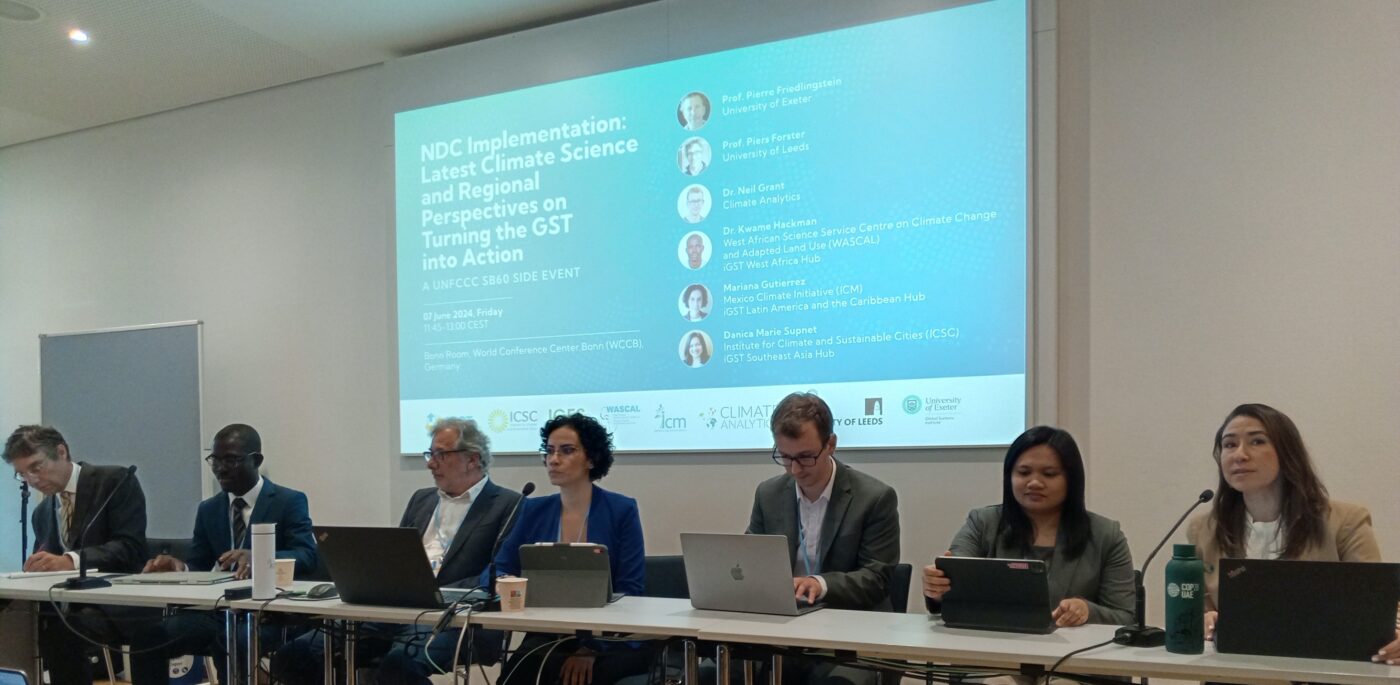
The urgency of climate action has never been more pronounced, and the SB60 side event held on 7th June 2024, in Bonn, Germany, provided a crucial platform for discussing the implementation of Nationally Determined Contributions (NDCs). Moderated by Josefina Cobián of the ClimateWorks Foundation, the event titled “NDC Implementation: Latest Climate Science and Regional Perspectives on Turning the GST into Action” brought together a diverse group of experts from different regions of the world, including Dr. Kwame Hackman, a senior scientist at WASCAL and coordinator of the iGST West Africa Regional Hub, to share insights and strategies on the topic. After setting the stage with keynote presentations on emission trends and strategies for implementing the GST Energy Package through a granular roadmap for action, regional perspectives from West Africa, Latin America and the Caribbean, and Southeast Asia were provided. This was followed by a discussion of potential barriers to the implementation of the first GST decision in the next round of NDCs (NDC 3.0) to be submitted by February 2025 (at least 9 months before CMA7 in November 2025). Finally, the experts highlighted ongoing regional initiatives that will facilitate the integration of the GST decision leading to greater climate ambitions.
Addressing Energy Crisis in West Africa
Dr. Kwame Hackman from the West African Science Service Centre on Climate Change and Adapted Land Use discussed the urgent need to address the energy demand crisis in West Africa using emerging renewable energy technologies. This, he said, is important to ensure that the region, despite its low emissions, does not resort to energy sources that will follow the same trajectory other regions followed and are now required to reverse due to the high levels of emissions. Accordingly, while applauding the efforts already being championed by WASCAL with funding from the German Federal Ministry of Higher Education and Research (BMBF), Dr. Hackman stressed the need for direct investment that would drive a move beyond pilot feasibility studies and capacity-building initiatives related to the production of renewable energy to actual production.
Transforming Energy in Latin America and the Caribbean
Mariana Gutierrez from Iniciativa Climática de Mexico highlighted the critical need for transforming the energy sector in Latin America. She outlined three key enabling conditions necessary for this transition:
- Strengthening Institutional Arrangements: Ensuring that decision-making processes are transparent, accountable, and inclusive of civil society and affected communities.
- Building Financial Structures: Supporting a just energy transition through financial mechanisms and skills training for the workforce.
- Creating Regulatory Frameworks: Establishing clear incentives and standards for phasing out fossil fuels and integrating climate considerations into national planning and budgets.
These steps, Mariana emphasized, are vital for increasing ambition, ensuring effective implementation, and fostering international cooperation, with a focus on equity, fairness, and transparency.
Decarbonization in Southeast Asia
Danica Marie Supnet from the Institute for Climate and Sustainable Cities (ICSC) shared insights into key sectors for decarbonization in Southeast Asia, particularly the energy, forestry, and land use sectors. Challenges such as inconsistent energy planning, underinvestment in power grid modernization, and the need for sustainable forest management were discussed. Danica underscored the importance of strong political and policy signals in countries like Indonesia and the Philippines to lead these efforts.
Broadening the Discussion: Insights from the Q&A Session
The panel then moved into a dynamic Q&A session, where discussions centered on challenges and opportunities associated with the integration of the first GST decision into NDC 3.0. Topics such as investment de-risking, capacity building (especially those that demystify the global GST decision into easily comprehensible regional ambitions), availability of adequate financial resources, and the integration of climate resilience into planning were explored. Discussions highlighted the importance of context-specific national sector investments and the critical nature of understanding and mainstreaming Global Stocktake (GST) decisions into regional activities.
Conclusion: A Unified Call for Action
The side event concluded with a unified call to address the implementation challenges of the Paris Agreement through increased ambition, strategic investments, and responsive policy adjustments. The insights shared underscored the interconnected nature of global and regional efforts required to combat climate change effectively.
The side event not only provided a platform for sharing valuable regional perspectives but also reinforced the global commitment to turning the Paris Agreement goals into actionable strategies. As we look forward, the lessons learned, and strategies discussed will undoubtedly play a crucial role in shaping future climate actions across the three regions.
